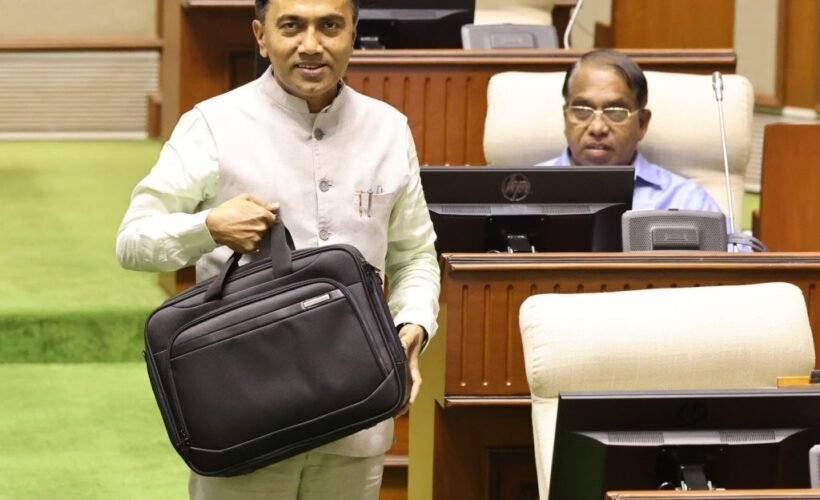
Chief Minister Dr Pramod Sawant’s vision towards a more holistic approach to fiscal stability and inclusive growth can be traced through the State Budget
Goa’s Chief Minister, Dr Pramod Sawant, recently unveiled the State’s Budget for the fiscal year 2024-25, showcasing a robust revenue surplus budget of `26,765 crore. The revenue surplus alone stands at `1,720 crore, indicating a commendable fiscal position. This substantial surplus reflects a well managed financial scenario, with no additional taxes burdening the citizens of Goa. The Gross State Domestic Product (GSDP) is anticipated to experience a notable growth of 13.87 per cent, contributing to the overall economic prosperity. A key highlight is the per capita income projection, set at 7.64 lakh, reflecting the positive economic trajectory and potential for individual financial growth. In a bid to address the issue of residential properties operating illegally as home stays, hotels, and restaurants, Dr Sawant introduced a onetime amnesty scheme. This initiative aims to regulate such establishments, aligning them with legal frameworks while providing a path to compliance. Financial support from the Central Government plays a pivotal role in Goa’s economic landscape. Dr Sawant revealed that the state received `750 crore as financial assistance for the fiscal year 2023-24, with an anticipated increase to `1,506 crore for the upcoming fiscal year 2024-25. This injection of funds underscores collaborative efforts between the state and central governments, fostering economic stability and development. Despite facing financial commitments such as social welfare schemes, debt servicing, and infrastructure development, the state government has refrained from imposing additional tax burdens on its citizens in recent financial years. Dr Sawant emphasised this during his address to the Assembly, attributing the fiscal resilience to measures like curbing revenue leakages and prudent
fiscal management. To address revenue leakages effectively, the government identified a significant issue concerning leave and license agreements between the government and private entities that often go un-renewed. In response, the state government plans to introduce regulations for such agreements, aiming to minimise revenue losses and ensure financial accountability. A significant portion of the Budget is earmarked for infrastructure development projects. This includes investments in roads, bridges, and other essential amenities that contribute to overall economic progress. By prioritising infrastructure, the government aims to enhance connectivity and lay the foundation for sustained economic growth. Despite financial constraints, the Budget reaffirms the government’s commitment to social welfare schemes. Allocations for healthcare, education, and poverty alleviation programs remain substantial, reflecting the administration’s dedication to improving the quality of life for its citizens. These targeted investments aim to create a more inclusive and equitable society.
Recognising the importance of education in fostering long-term growth, a significant portion of the budget is directed towards the education sector. Initiatives related to school infrastructure, teacher training, and skill development programs are prioritised to empower the youth and equip them for the evolving job market. The ongoing global health challenges have underscored the importance of a robust healthcare system. The Budget allocates funds to strengthen healthcare infrastructure, ensuring access to quality medical services for all residents.Investments in healthcare technology,
training, and facilities aim to enhance the state’s preparedness for health emergencies. In alignment with global efforts towards sustainability, a portion of the Budget is dedicated to environmental conservation initiatives. This includes investments in renewable energy, waste management, and conservation projects. By addressing environmental concerns, the government aims to create a more resilient and eco-friendly state. In the pursuit of financial stability, the government has made strategic decisions, including adjustments in fees for commercial establishments, land revenue, and the Town and Country Planning Department. Notably, Dr Sawant assured that these adjustments were made with a careful consideration to prevent any adverse impact on the citizens. This reflects a balanced approach to revenue generation without unduly burdening the public.
The budget places emphasis on initiatives that stimulate economic activity and employment generation. By supporting entrepreneurship, promoting small and medium enterprises (SMEs), and diversifying the economy, the government aims to create a conducive environment for sustainable development and job creation. The strategic allocation of resources across diverse sectors reflects a nuanced understanding of Goa’s needs and aspirations. As the government navigates the challenges of a dynamic economic landscape, the State Budget positions Goa for a future marked by inclusive growth, social well-being, and environmental sustainability. Through prudent financial management, collaboration with the central government, and targeted regulatory measures, the Chief Minister aims to steer the state towards a prosperous and sustainable future.





